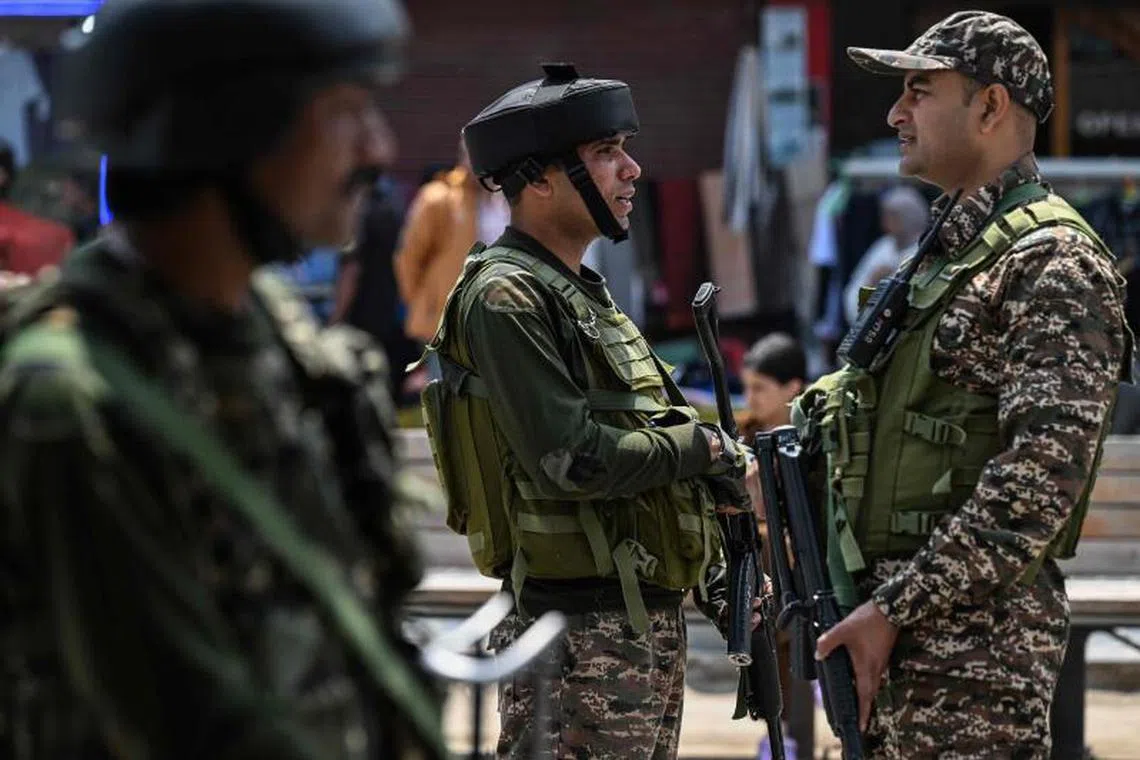Pakistan conducts 2nd missile test, India orders civil defence drills as fears of conflict grow
Sign up now: Get insights on Asia's fast-moving developments

Indian paramilitary soldiers keeping guard in Srinagar on May 4. Kashmir is divided between India and Pakistan but claimed in full by both.
PHOTO: AFP
Follow topic:
ISLAMABAD – Pakistan conducted a second missile test and India ordered civil defence drills in an escalating stand-off over contested Kashmir that the United Nations said on May 5 has brought the two nations to the brink of war.
New Delhi blames Pakistan for an attack
Pakistan rejects the accusations, and has repeatedly made clear it will respond with force to any aggression by India.
UN chief Antonio Guterres on May 5 said relations between Pakistan and India had reached a “boiling point”, warning that “now is the time for maximum restraint and stepping back from the brink” of war.
The Pakistani military said on May 5 it had tested a surface-to-surface missile with a range of 120km, a launch “aimed at ensuring the operational readiness of troops”.
The missile test comes as Iran’s top diplomat Abbas Araghchi was in Islamabad for talks with Prime Minister Shehbaz Sharif on May 5, ahead of a visit to India on May 8.
Tehran has offered to mediate between the two nuclear-armed neighbours, and Mr Araghchi will be the first senior foreign diplomat to visit both countries since the attack on April 22 sent relations into a tailspin.
Iranian Foreign Ministry spokesman Esmaeil Baqaei said: “We will spare no effort to help de-escalate the situation between the two countries.”
Pakistan announced a previous test on May 3 of a surface-to-surface missile with a range of 450km – about the distance from the Pakistan border to New Delhi. It has not said where either of the tests took place.
Mr Sharif, who cancelled a visit to Malaysia scheduled for May 9, said the launch “clearly shows that Pakistan’s defence is in strong hands”.
India’s Information Ministry officials said several civil defence “mock drills” would take place on May 7, preparing people to “protect themselves in the event of a hostile attack”.
Mr Kanchan Gupta, a senior adviser from the ministry, said in a statement that the drills would involve rehearsing an “evacuation plan”. The drills will also test air raid warning sirens, prepare for blackouts, and prepare vital installations for camouflage.
Calls to reduce tensions
Muslim-majority Kashmir, a region of around 15 million people, is divided between Pakistan and India but claimed in full by both.
Rebels in the Indian-run area have waged an insurgency since 1989, seeking independence or a merger with Pakistan.
India regularly blames its neighbour for backing gunmen behind the insurgency.
Hindu nationalist Indian Prime Minister Narendra Modi has said India will “identify, track and punish every terrorist and their backer” who carried out the attack in Pahalgam, and will “pursue them to the ends of the earth.”
Pakistan’s government has denied any involvement in the shooting and vowed that “any act of aggression will be met with a decisive response”.
No group has claimed responsibility for the killing on April 22 of 26 mainly Hindu men in the tourist hot spot of Pahalgam, but Indian police are seeking at least two Pakistani citizens whom they say are among the alleged gunmen.
International pressure has been piled on New Delhi and Islamabad, which have fought several wars over the disputed Kashmir region.
US Vice-President J.D. Vance has called on India to respond to the attack in a way “that does not lead to a broader regional conflict”.
He also urged Pakistan to “make sure that the terrorists sometimes operating in their territory are hunted down and dealt with”.
Russia’s Kremlin spokesman Dmitry Peskov told reporters on May 5 that Moscow was “following with great concern the atmosphere that has developed on the border”, calling for both nations to “reduce tensions”.
In Indian-run Kashmir, a vast hunt seeking the gunmen continues across the territory, while those living along the frontier are moving farther away – or cleaning out bunkers, fearing conflict.
On the Pakistani side, emergency drills have been carried out on playing fields, residents have been told to stock up on food and medicine, and religious schools have closed. AFP

